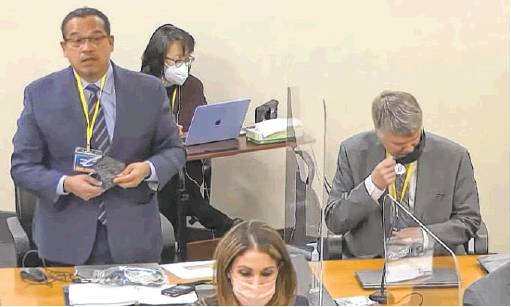Charges in the George Floyd Case Explained
This explanation of the charges against officers in connection with the death of George Floyd appeared in the Minneapolis Star Tribune on March 12, 2021.

Minnesota Attorney General Keith Ellison addresses the court concerning reinstatement of a third-degree murder charge
against Derek Chauvin on the opening day of trial, March 8, 2021
What is second-degree unintentional murder?
For a conviction of second-degree unintentional murder, the state’s prosecutors will have to show beyond a reasonable doubt that Chauvin caused Floyd’s death while assaulting him. This is the most serious charge and carries a presumed sentence in this case of 10 ¾ years to 15 years, according to state sentencing guidelines. The cause of Floyd’s death is likely to be a major focus of the trial. Expect the defense to question Floyd’s overall health and try to claim that he was already compromised before Chauvin put his knee on his neck. Prosecutors are likely to assert that Floyd would still be alive if the former officer hadn’t pinned his neck to the ground for about nine minutes. There will almost certainly be much discussion about Floyd’s drug use and underlying health conditions. What will not be an issue: whether Chauvin intended to kill Floyd. None of the charges require prosecutors to prove the former officer was trying to kill him.
What is third-degree murder?
Third-degree murder requires prosecutors to prove that someone caused the death of another “by perpetuating an act eminently dangerous to others and evincing a depraved mind, without regard for human life.” It also carries a presumptive sentence in this case of 10 ¾ years to 15 years, according to state sentencing guidelines. Legal experts note that the definition of “depraved mind” is murky — as is the legal line between “depraved mind” and the “culpable negligence” standard for manslaughter. Historically, third-degree murder has been used to prosecute drug dealers who sold deadly products but weren’t planning to kill specific individuals. But in 2019, former Minneapolis police officer Mohamed Noor was convicted of third-degree murder in the death of Justine Ruszczyk Damond after she called 911 to report a possible sexual assault in progress in the alley near her house. Noor fatally shot Damond from the passenger seat of a squad car, firing across his partner, who had been driving. The state Court of Appeals narrowly upheld his conviction, and the state Supreme Court will hear the case in June. Noor is now serving a 10 ½-year sentence. He is the only police officer ever to be convicted of murder for an on-duty incident in Minnesota. Explaining his decision to reinstate the third-degree murder charge, Cahill noted that the Noor ruling established a legal precedent that “murder in the third degree applies even if the person’s intent and acts are directed at a single person,” and therefore the charge could be applicable to the Chauvin case.
What is second-degree manslaughter?
In order to convict Chauvin of second-degree manslaughter, prosecutors will need to show beyond a reasonable doubt that he was “culpably negligent” and took an “unreasonable risk” with Floyd’s life when he restrained him and that his actions put Floyd at risk of death or great harm. Prosecutors do not have to prove that Chauvin’s actions caused Floyd’s death, only that his actions put Floyd at risk of death or great bodily harm. This charge carries a presumptive sentence of 41-57 months.
What charges are the other officers facing?
Three other Minneapolis officers who were present during the encounter with Floyd — J. Alexander Kueng, Thomas Lane and Tou Thao — each face two charges: aiding and abetting both second-degree unintentional murder and second-degree manslaughter. On those charges, prosecutors will need to prove beyond a reasonable doubt that the three intentionally aided, advised, hired, counseled or conspired with Chauvin. If prosecutors fail to convict Chauvin, the case against the other officers becomes tougher to prove.
